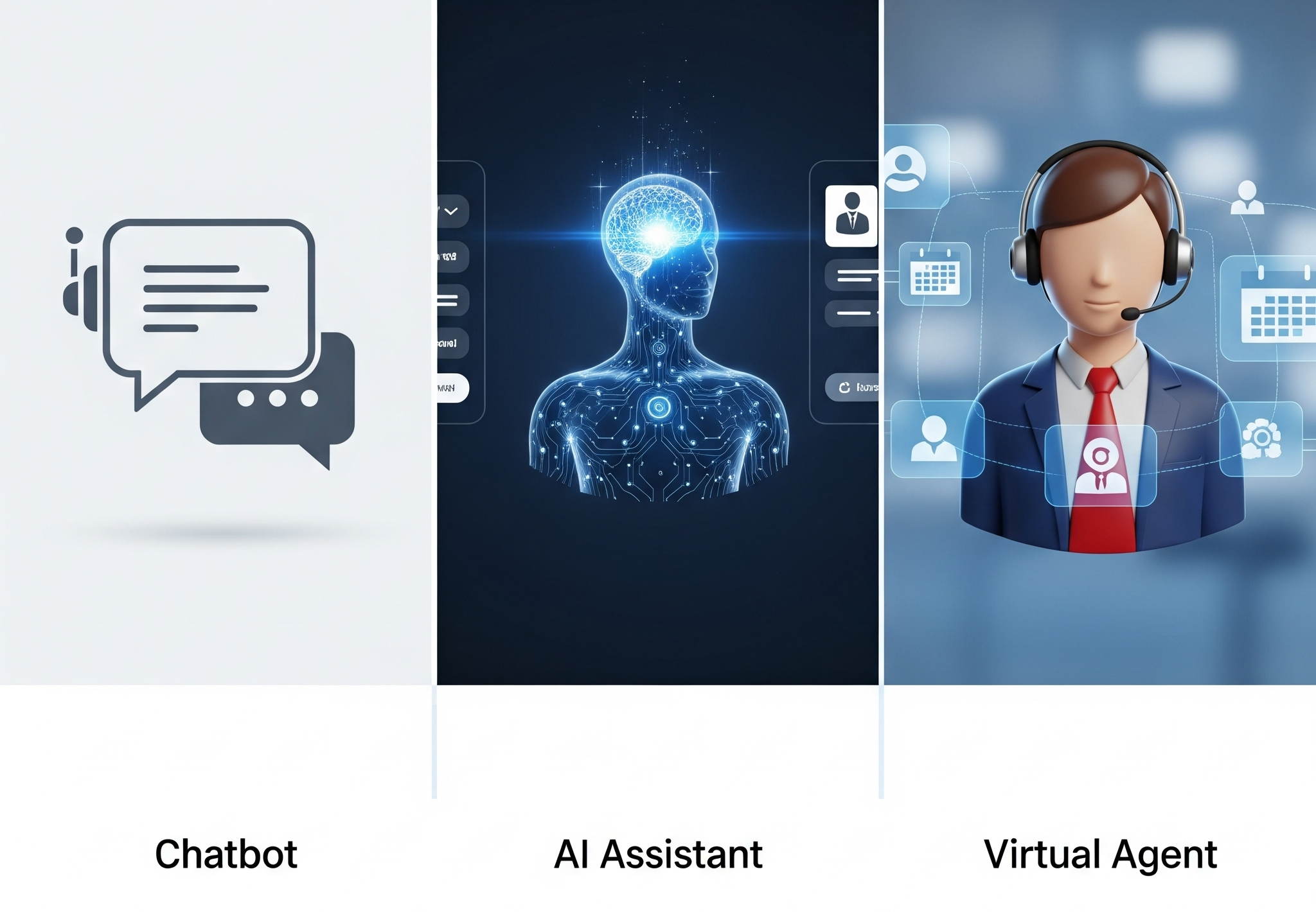Chatbot, AI Assistant, or Virtual Agent: What’s the Difference?

In the AI space, terms like chatbot, AI assistant, and virtual agent often get used interchangeably. But if you’re running an e-commerce store, these differences matter. Each tool comes with unique capabilities, and knowing what’s what helps you pick the right solution for your business.
Let’s break it down.
Chatbot: The Script-Bound Responder

A chatbot represents the most fundamental and foundational of these AI tools. At its core, a chatbot functions much like a sophisticated, digital FAQ system. Its primary purpose is to deliver pre-programmed, rule-based answers to common and frequently asked inquiries. Typical questions a chatbot can readily answer include:
- Where is my order?"
- What is your return policy?
- Do you offer international shipping?
Traditional chatbots operate strictly within their defined scripts and pre-configured decision trees. They excel at handling predictable, repetitive queries where the answers are straightforward and static. However, their limitations become apparent when faced with more complex, nuanced, or unstructured requests. They lack the cognitive ability to interpret visual data, understand abstract concepts, or engage in unscripted dialogue.
AI Assistant: The Intelligent Problem-Solver
This is where the true innovation, as exemplified by Neuralens AI, truly distinguishes itself. An AI assistant transcends the inherent limitations of scripted responses, offering a sophisticated array of advanced capabilities that are deeply integrated with business objectives.
An AI assistant isn't just about deflecting queries; it's about actively contributing to the business's bottom line.
Its capabilities include:
- Catalog Enrichment: AI enriches product catalogs with comprehensive details like nutritional facts or dimensions by analyzing diverse product labels, specifications, and unstructured data.
- Visual Product Discovery: Shoppers can upload images for the AI to find visually similar or exact products, transforming the shopping experience.
- Personalized Recommendations: AI delivers tailored product suggestions using machine learning, analyzing browsing history, purchase patterns, and real-time interactions.
- Performance Tracking and Analytics: AI continuously monitors KPIs, analyzes customer interactions, identifies pain points, and provides actionable insights to optimize strategies and improve AI's effectiveness.
Virtual Agent: The Human Emulation
Virtual agents bridge the gap between chatbots and AI assistants, simulating human-like conversations using NLP and sometimes voice. They excel in complex, multi-step dialogues for sectors like travel (bookings, itineraries) and finance (account inquiries, loan applications), where nuanced communication is crucial. In e-commerce, virtual agents focus on customer service and support, handling general inquiries and complex returns. While not specialized in proactive product discovery or sales analytics like dedicated AI assistants, their strength lies in maintaining natural conversation and addressing a wide range of service issues.
The Neuralens AI Advantage
At Neuralens AI, our developmental philosophy extends far beyond merely creating a basic chatbot or a general-purpose virtual agent. Our platform is engineered as a comprehensive AI assistant, meticulously designed and optimized for the specific and demanding requirements of modern e-commerce. This specialized focus allows us to deliver unique advantages, including:
- Enhanced Product Discovery: Moving beyond keyword searches, our AI assistant enables customers to discover products through visual search, natural language queries (e.g., "Show me a formal blue dress suitable for a summer wedding"), and intelligent recommendations, leading to higher engagement and conversion rates.
- Automated Catalog Enrichment: Our AI can automatically extract and integrate valuable data points from various sources into your product catalog, keeping information accurate, comprehensive, and up-to-date without manual effort.
- Real-time Analytics on Conversations and Conversions: Gain unprecedented insights into customer behavior. Understand what customers are asking, what products they're interested in, and how interactions translate into sales, allowing for continuous optimization of both the AI and your business strategy.
The difference matters because your business goals matter. If you just need FAQs, a chatbot will do. If you need human-like simulations, a virtual agent is fine. But if you want to turn conversations into sales, an AI assistant is the real answer.
You can check out Neuralens AI for increased Conversion rates and better Browser to Buyer Ratio
Reach out to us and we can set up a demo on your products.
Send "Hi" to us at hello@neuralens.ai
